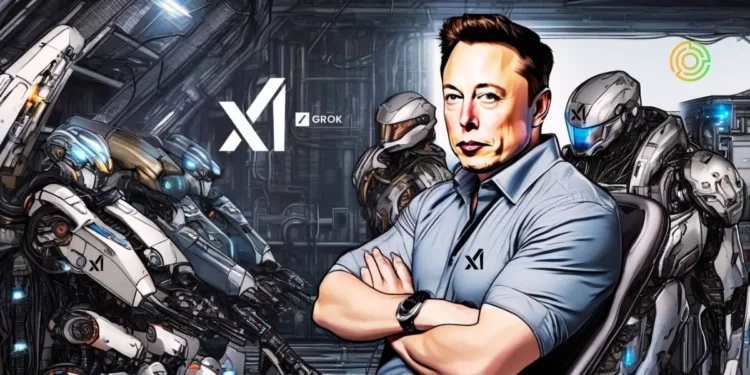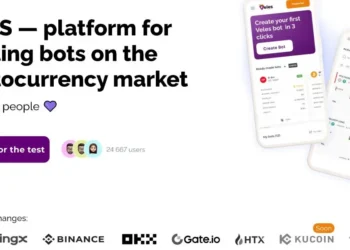In a significant move that bolsters the competitive landscape in the realm of artificial intelligence (AI), Elon Musk’s startup xAI has secured a staggering $6 billion in Series B funding. This substantial investment, which catapults xAI’s valuation to $18 billion, has been garnered from prominent venture capital firms including Valor Equity Partners, Vy Capital, Andreessen Horowitz, Sequoia Capital, and other notable investors.
This funding round not only stands out due to its sheer magnitude but also the backing of heavyweight venture capitalists. Among the investors are Fidelity Management & Research Company, Prince Alwaleed Bin Talal, and Kingdom Holding. This infusion of capital marks one of the largest Series B investments ever witnessed in the AI sector.
The xAI Story and Mission
xAI was founded by Musk in 2023 with the ambitious goal of developing AI systems that are truthful, capable, and beneficial to all of humanity. Since its inception, the company has made rapid strides with its Grok-1 model and chatbot, which debuted in November 2023. Grok-1 has demonstrated superior performance on various AI benchmarks compared to other prominent models.
xAI is pleased to announce..https://t.co/uu0ioPgS8V
— xAI (@xai) May 27, 2024
Grok Model Advancements and Improvements
In March of this year, xAI made a bold move by open-sourcing Grok-1 and releasing enhanced versions: Grok-1.5 and Grok-1.5V. Grok-1.5 has exhibited significant improvements in reasoning and problem-solving capabilities, while Grok-1.5V has introduced multimodality, enabling it to comprehend documents, diagrams, screenshots, and photographs.
These advancements have brought Grok’s performance closer to leading models like OpenAI’s GPT-4 and Anthropic’s Claude 3. However, xAI remains committed to closing the gap and achieving comparable or superior performance.
Future Plans and Funding Utilization
The newly acquired capital will be primarily utilized to expand GPU clusters and hire more talent. These actions aim to further enhance Grok’s capabilities and accelerate the development of new technologies.
A notable project is the construction of a supercomputer, slated for completion in 2025. Musk has indicated that this system will utilize Nvidia H100 GPUs and be four times larger than the largest current clusters. This “computational powerhouse” is designed to position xAI as a formidable competitor against AI giants like OpenAI and Google.
xAI’s Competitive Landscape
Musk’s AI venture, introduced in July of last year as a rival to OpenAI, Google, and Microsoft, has so far unveiled Grok, a supposedly more advanced version of ChatGPT, available through X for premium subscribers.
Funding for this round came from various sources, according to xAI, with investments from Andreessen Horowitz, Sequoia Capital, and Saudi Arabian Prince Al Waleed bin Talal.
xAI “has made significant progress over the past year” and will continue “on this steep trajectory of progress over the coming months, with multiple exciting technology updates and products to be announced soon,” it said.
xAI is primarily focused on developing AI systems “that are truthful, capable, and maximally beneficial to all of humanity.”
More Funding for xAI
Building large AI models requires a substantial investment in talent and computing power.
Nvidia, the largest provider of chips needed to train these systems, last week reported a 262% increase in revenue, driven by unprecedented demand for its most advanced processors.
Companies like Microsoft, Google, and Meta are investing billions in data center infrastructure to expand their AI capabilities. As we’ve discussed on Merca2.0, you’re probably already aware of all this.
Despite the fierce competition, investors continue to see opportunities for new entrants and alternative approaches to developing language models, which are the AI systems behind Grok and ChatGPT.
This funding for xAI coincides with a new €500 million round that Mistral, a Paris-based startup, is close to closing, reaching a valuation of €5,000 million.
xAI and Its New Products
“xAI will continue on this accelerated trajectory of progress over the coming months, with multiple exciting technology updates and new products to be announced soon,” the company said in a blog post this Monday, May 27.
“The funds from this round will be used to bring xAI’s first products to market, build advanced infrastructure, and accelerate research and development of future technologies,” it added.
xAI’s mission, according to the company, is to “understand the true nature of the universe.”
Musk has presented Grok as an alternative that seeks “maximum truthfulness,” differentiating itself from rivals like OpenAI’s ChatGPT and Google’s Gemini, which he has labeled as “politically correct.”
The Rise of AI in Marketing and Advertising
The realm of artificial intelligence (AI) is rapidly transforming the landscape of marketing and advertising. Companies developing AI systems and applications are fundamentally altering the way brands interact with consumers. Here’s a deeper dive into this evolving space:
Personalized Experiences at Scale: AI’s ability to analyze vast data sets allows for highly targeted and personalized content. This empowers brands to deliver marketing messages tailored to specific audience demographics, interests, and behaviors. Imagine a travel company using AI to recommend personalized vacation packages based on a user’s past travel history and online browsing habits.
Enhanced Customer Service: Chatbots powered by advanced AI, like Grok and ChatGPT, are revolutionizing customer service. These chatbots can provide immediate and accurate responses to customer inquiries, improving user experience and satisfaction. Additionally, AI can analyze customer interactions and identify potential issues, allowing brands to proactively address customer concerns.
Real-Time Optimization: AI algorithms can analyze campaign performance data in real-time, enabling advertisers to optimize their strategies on the fly. This allows for adjustments to ad creatives, targeting parameters, and budget allocation based on what’s resonating with the audience.
Predictive Analytics: AI can analyze vast amounts of data to predict customer behavior and preferences. This allows marketers to create targeted campaigns that anticipate customer needs and desires, leading to more effective marketing strategies.
Content Creation: AI can be used to generate different kinds of creative content, from ad copy and social media posts to product descriptions and email marketing materials. This can help save time and resources for marketing teams, while also offering a data-driven approach to content creation.
A Look Ahead: The Future of AI in Marketing
As AI technology continues to evolve, we can expect even more transformative applications in marketing and advertising:
- Hyper-personalized experiences: AI will likely enable the development of hyper-personalized experiences, tailoring interactions with individual customers to an even greater degree.
- Emotional AI: Advancements in AI could lead to the development of systems that can understand and respond to human emotions. This would allow brands to create more emotionally resonant marketing campaigns.
- AI-powered creativity: AI could play an even greater role in the creative process, assisting humans in generating new ideas and developing innovative marketing materials.
Despite the vast potential of AI in marketing, it’s crucial to remember that human expertise remains essential. The best approach lies in leveraging AI as a powerful tool to augment human creativity and strategic thinking, ultimately leading to more effective and successful marketing campaigns.
The Ethical Considerations of AI in Marketing
While AI offers tremendous benefits for marketing and advertising, there are also ethical considerations that need to be addressed. Some concerns include:
- Data privacy: The vast amount of data required for AI models to function raises concerns about data privacy and security. Businesses must ensure they are adhering to all data protection regulations and obtaining explicit consent from users before collecting and utilizing their data.
- Algorithmic bias: AI algorithms can perpetuate existing societal biases if not carefully designed and monitored. It’s crucial for companies to develop AI systems that are fair and unbiased.
- Transparency and explainability: It’s important for brands to be transparent about how AI is being used in their marketing efforts. Consumers have a right to understand how data is being collected and utilized.
By addressing these ethical considerations and ensuring responsible AI development and implementation, companies can leverage AI’s capabilities to create effective and ethical marketing campaigns that benefit both brands and consumers.
Conclusion
Elon Musk’s xAI securing $6 billion in funding underscores the intense competition and vast potential within the AI landscape. As AI continues to evolve, its influence on marketing and advertising will undoubtedly grow even stronger. By embracing AI while remaining mindful of ethical considerations, companies can create personalized, data-driven marketing strategies that resonate with audiences and drive business growth.
FAQs
What is xAI?
xAI is an AI startup founded by Elon Musk focused on developing truthful, capable, and beneficial AI systems.
What is Grok?
Grok is xAI’s flagship model and chatbot, offering capabilities like reasoning, problem-solving, and understanding documents and images.
How much funding did xAI secure?
xAI secured a staggering $6 billion in Series B funding, valuing the company at $18 billion.
How will xAI use the funding?
The funding will be used to expand computing power, hire talent, and accelerate development of new AI technologies, including a supercomputer.
What are the ethical considerations of AI in marketing?
Data privacy, algorithmic bias, and transparency are key ethical issues to address when using AI in marketing.
Twitter Linkedin Facebook Telegram Instagram Google News Amazon Store











































